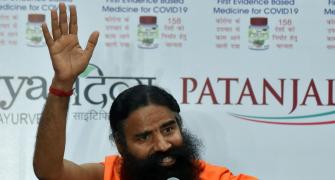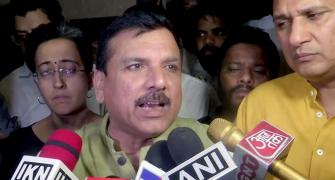"There are infrastructure constraints at the ports. There is no way to detect if harmful material or radioactive substances get imported or exported out of the country. One has to be very careful in importing scrap metal as well," said a government official familiar with the procedures related to foreign trade.
Recently, a European country found traces of a radioactive material in a consignment containing steel products. In fact, experts say, this has been happening since 2007.
The root of the problem, according to government officials and exporters, is some radioactive steel scrap that was imported into India about three to four years back. This scrap was used to manufacture packaging material for heavy-duty engineering goods consignments. Subsequently, when consignments packed with this radioactive steel were exported to the United States in 2007, alarm bells started ringing at the ports there.
But the fact that such contaminated material was not detected when it was being imported or exported in the form of packaging material, shows that Indian ports are not equipped to detect radioactive substances. Therefore, anti-social elements could easily import dirty bombs -- unsophisticated explosive devices that combine radioactive material and conventional explosives -- into the country.
When asked, a Central Board of Excise and Customs spokesperson said the department mostly tracked valuation of export and import consignments and import of banned substances. "There is a scanner for container surveillance at Nhava Sheva (near Mumbai). The process to increase the number of scanners at ports is on," she said.
According to sources in the shipping ministry, most of India's metal scrap is imported through the Kandla port in Gujarat, with the remaining coming through Chennai, Visakhapatnam and Tuticorin ports. The source added that none of these ports have equipment to detect radioactive substances. Many a time, metal scrap has been found to contain ammunition, including guns and grenades.
A blast at a plant operated by Bhushan Steel in October 2004 brought the issue to the forefront. The plant was processing imported metal scrap allegedly having explosive material.
Engineering exporters recall that in 2007, about 200 containers exported from the Kolkata port were detected to have radioactive traces. "These were either returned back or impounded. But that was a lesson for us and an awareness programme was started to deal with the issue," said Suranjan Gupta, senior joint director, Engineering Export Promotion Council.
However, foreign seaports in US and Europe continued to receive consignments with radioactive traces from India. As recently as January, an export consignment of a Mumbai-based company was found to have traces of radioactivity.
The steel ministry discussed the issue in a meeting recently. Government sources said the steel scrap used to manufacture packaging material of the Mumbai-based company was imported from the Commonwealth of Independent States countries by Vipras Castings Ltd, a Raigarh-based firm.
"The government received a letter from the Indian embassy in Germany, citing a local media report about the detection of radioactive substances in a consignment from India. This was followed by another letter, citing another media report in Germany saying the level of radioactivity was not hazardous," said a steel ministry official.
According to Rakesh Shah, former chairman of the Engineering Export Promotion Council, many exporters in eastern India have bought scanners to detect radioactivity in the material that they use.








